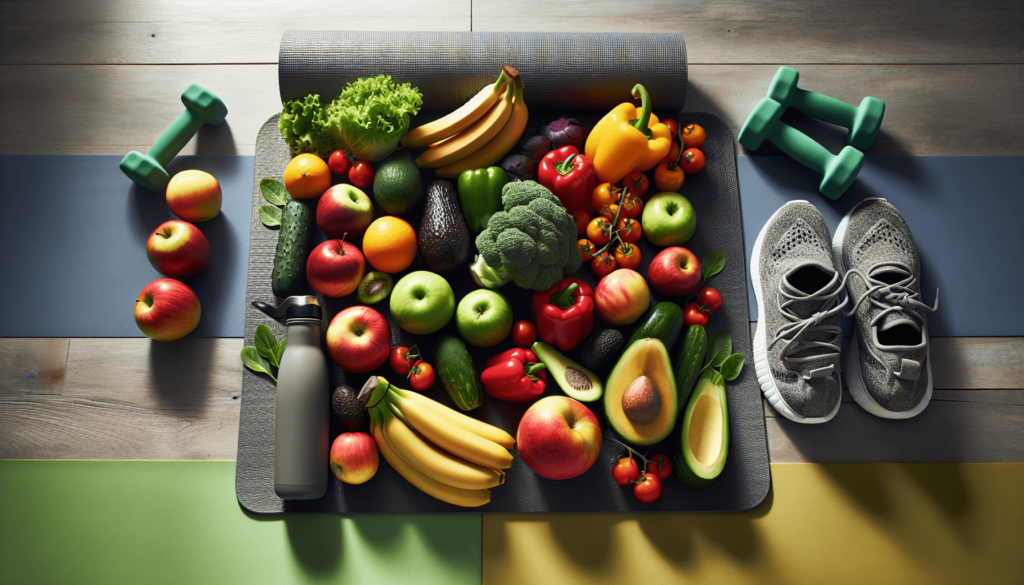Do you ever feel like stress is just another household member, sharing your bed, hogging the bathroom, and even taking over your brain? Well, guess what? You’re not alone. Stress has become the uninvited guest at everyone’s dinner table. The good news is, there are ways to give stress the boot, and they are simpler than you think. In fact, bouncers come in the form of diet and exercise.

The Mystery of Stress
Stress, oh stress! The unsung villain lurking in the shadows of our lives. It’s that weird sensation you get when your mother-in-law decides to drop by unannounced or when your boss suddenly decides that a deadline should be moved up—by three weeks.
What Exactly is This Stress?
Okay, let’s get all technical for a moment. Stress is your body’s way of responding to any kind of demand or threat. When you sense danger—whether it’s real or imagined—the body’s defenses kick into high gear in a rapid, automatic process known as the “fight-or-flight” reaction, or the stress response.
Imagine your cat seeing a dog for the first time. Yep, that’s pretty much how your body reacts internally. Your heart races, muscles tighten, blood pressure rises, breath quickens, and your senses become sharper. You’re ready to either fight off the attacker or run like the wind, even if the “attacker” is just a pile of overdue laundry.
The Food-Mood Connection
What if food was not only for survival but also your superhero sidekick against stress? Turns out, what you eat could be making you less of a Marvel superhero and more of a stressed-out villain. Forget kryptonite; bring on anti-inflammatory foods!
Nutrients to Kick Stress in the Butt
Like any superhero, you need a utility belt packed with awesome gadgets—in this case, nutrients. Here’s the line-up:
| Nutrient | Role in Stress Management | Examples of Foods |
|---|---|---|
| Magnesium | Helps muscle relaxation and reduces headaches | Spinach, almonds, avocados |
| Vitamin C | Reduces levels of stress hormones | Oranges, strawberries, bell peppers |
| Omega-3 Fatty Acids | Lowers anxiety and inflammation | Salmon, flaxseeds, walnuts |
| Complex Carbs | Boost serotonin levels (the happy chemical) | Oatmeal, whole grain bread, quinoa |
Foods That Bring the Drama (Stress)
On the flip side, let’s talk about the food villains—the bad guys that make stress barge in and throw a hissy fit.
| Villainous Food | Why It’s Evil |
|---|---|
| Caffeine | It can crank up the anxiety and cause the jitters |
| Added Sugar | Blood sugar spikes and crashes can mess with your mood |
| Alcohol | It might seem relaxing, but it disrupts sleep and messes with your stress hormones |
Rule of thumb: If it makes you feel like dancing on tables the night before, it will make you feel like hiding under them the next day.
The Wondrous World of Exercise
Granny was right—get yourself up and moving! Exercise is like a natural stress-relief pill without the undesirable side effects. You won’t have to listen to someone rattling off 20 seconds of side effects at the end of a commercial.
Why Exercise Smacks Stress
When you exercise, your body releases endorphins, the supernatural beings responsible for happy vibes. Ever heard of the “runner’s high”? It’s not just for runners. These endorphins are basically the Robin to your Batman, helping you combat stress monsters.
Types of Exercises to Make Stress Run Away Crying
Here’s a shopping list of exercises that can help keep stress levels at bay:
| Type of Exercise | Benefits | Examples |
|---|---|---|
| Cardiovascular | Reduces anxiety, improves sleep quality | Running, cycling, swimming |
| Strength Training | Increases resilience, combats fatigue | Weight lifting, resistance bands |
| Yoga & Pilates | Enhances relaxation, improves flexibility | Downward dog, plank, vinyasa flow |
| Mindfulness-Based | Lowers cortisol levels, improves mental focus | Tai Chi, meditation, gentle stretching |
Is group exercise a Stress-Buster or Stress-Multiplier?
Wondering if dragging yourself to a spin class will amp up your stress due to social interaction, or dial it down? The answer lies in your personality type. If you’re the social butterfly, group exercises can be a party in the name of stress relief. For the introverts, a solo jog might be just what Dr. Feelgood ordered.

The Dynamic Duo: Food and Fitness Combo
You’ve got the horse (diet) and the carriage (exercise); now let’s put it all together into a majestic pageant to oust stress.
Smart Snacking Before Your Workout
Imagine going to the gym on an empty stomach—pretty much like Avengers without their gear. Here’s how to fuel up the right way:
| Snack Option | Benefits |
|---|---|
| Banana with peanut butter | Good balance of carbs and protein |
| Greek yogurt with honey | Protein-packed for muscle repair |
| Whole grain toast with avocado | Healthy fats and complex carbs for energy |
Post-Workout Meal: Because You Deserve It
After an intense session, your body is like a sponge, absorbing nutrients like there’s no tomorrow. Treat it well with these:
| Meal Option | Benefits |
|---|---|
| Grilled chicken with quinoa and veggies | Protein for muscle recovery and carbs for energy |
| Smoothie with spinach, berries, and protein powder | Quick, nutrient-dense, and refreshing |
| Omelet with mixed vegetables | Great combination of protein and vitamins |
Knowing how to combine diet and exercise efficiently not only helps in kicking stress’s butt but also boosts your overall happiness and health.
Sleep: The Unsung Hero
You can gobble all the kale and push all the iron, but if you’re not catching enough Zs, you might as well be trying to fill a bathtub with a fork.
The Stress and Sleep Tango
Sleep and stress have the ultimate love-hate relationship. Too much stress can turn your dreams into a late-night horror show, and lack of sleep can make you more stressed than a cat in a room full of rocking chairs.
Napping for Dummies
Think of naps as mini-vacations for your brain. A 20-minute power nap can recharge you more effectively than a gallon of coffee. So, if someone accuses you of being lazy for napping, just tell them you’re practicing self-care in the face of stress.
The Mental Battle: Mind Over Mattress
Adopting new eating habits and getting into the groove of regular exercise isn’t just about willpower. You need a game plan because, my friend, old habits die harder than Bruce Willis in an action movie.
Setting Realistic Goals
You’re not going to transform into a zen yogi overnight, and that’s perfectly fine. Here’s a more realistic approach:
| Goal | Strategy |
|---|---|
| Eat healthier | Replace one unhealthy snack a day with a fruit |
| Increase exercise | Start with 15-minute daily walks and gradually extend |
| Improve sleep | Incorporate a wind-down routine 30 minutes before bed |
Cheat Days: The Plot Twist
Ah, Cheat Days. These are your little reprieves from a stressful life. A day when calories don’t exist and the only rule is that there are no rules. Remember, it’s a cheat day, not a cheat week. Keep it balanced, so those stress-relieving habits don’t end up causing more stress.
The Power of Routine
There’s nothing sexier than a routine when it comes to reducing stress. Sorry, spontaneity—go take a hike.
Morning Routine that Actually Wakes You Up
Start your day with a stretch and a glass of water. It’s like telling your body, “Hey, we’re up! Time to shine!” Follow up with a balanced breakfast. Maybe do some light exercises or even just a short stroll. This sets the tone for a less stressful day.
| Morning Routine Steps | Benefits |
|---|---|
| Light Stretching | Increases flexibility and blood flow |
| Hydration | Wakes up your digestive system |
| Balanced Breakfast | Stabilizes blood sugar and mood |
Evening Routine that Actually Makes You Sleep
Just like toddlers, adults thrive on a predictable bedtime routine. Dimming the lights, reading a book (no, scrolling Facebook doesn’t count), and unplugging from electronics can make falling asleep easier.
| Evening Routine Steps | Benefits |
|---|---|
| Turn off screens | Reduces blue light exposure, promotes melatonin |
| Light reading | Relaxing, gets you in sleep mode |
| Herbal tea | Calms the nervous system |
Social Connections: Because You Really Can’t Do it Alone
Remember those group exercises? Guess what? Social connections outside of the gym also matter. Being surrounded by a supportive network can make the difference in managing stress. Find yourself some stress-busting buddies for your journey.
The Zen of Human Interaction
Whether it’s calling a friend, joining a book club, or even talking to your plants (no judgment here), social interactions can cap daily stress levels. Time spent socializing gives your mind a break from individual worries and provides a sense of belonging.
Professional Help: When You Need a Superhero
Sometimes, even the best diet and exercise regimen won’t be enough. There’s no shame in calling in the big guns.
Therapy: The Secret Weapon
A therapist can help you untangle those mental knots that make stress worse. Cognitive Behavioral Therapy (CBT) is hugely effective for stress-related issues. It teaches you to challenge and change unhelpful behaviors and thoughts.
Putting it All Together: Your Blueprint for a Stress-Free Life
Congratulations! You’ve made it through the guide to fighting stress with diet and exercise. By now, you should have a pretty solid idea of how to tackle stress, head-on.
Quick Recap:
| Key Area | Action |
|---|---|
| Diet | Load up on superfood, avoid junk |
| Exercise | Mix cardio, strength, and mindfulness |
| Sleep | Consistent and restful |
| Routine | Structured morning and evening |
| Socializing | Increased human connection |
| Professional Help | Seek therapy if needed |
Remember, this isn’t a one-size-fits-all solution. Individual needs vary, so mix and match these tips like you’re making a custom salad at a fancy deli.
Approach each day armed with nutrient-rich food, a bit of exercise, and a decent night’s sleep, and soon enough, stress won’t even have the nerve to RSVP to your life.
Go ahead, take a deep breath—you’ve got this!
